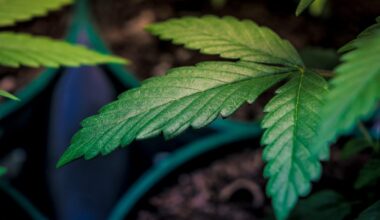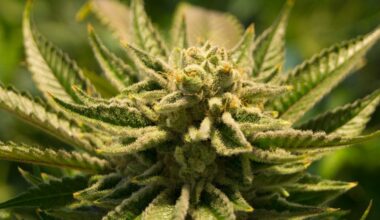A North Carolina Senate committee on Tuesday approved a revised bill to legalize medical marijuana in the state.
This comes one week after the panel held a hearing to discuss the legislation and approve changes, but members did not vote at that prior meeting. Senators advanced the measure this time in a voice vote.
A previous version of the reform legislation cleared Judiciary and another committee last month, but it was rereferred earlier this month.
The bill must still clear the Senate Health Care and Rules and Operations Committees in order to reach the floor before potentially heading to the House of Representatives and then to the governor’s desk.
“We’re encouraged that SB711 has been advanced by the Judiciary Committee,” DeVaughn Ward, senior legislative counsel for the Marijuana Policy Project, told Marijuana Moment. “This a crucial hurdle that has been cleared on the road to full passage”.
Under the proposal, sponsored by Rules Committee Chairman Bill Rabon (R), patients would be allowed to access cannabis if they have a “debilitating medical condition” such as cancer, epilepsy, HIV/AIDS, Parkinson’s disease, multiple sclerosis and post-traumatic stress disorder.
The committee substitute was changed to allow patients with terminal illnesses and have six months to live, as well as those with conditions resulting in hospice care, to also qualify for cannabis.
Patients could possess up to one and a half ounces of cannabis, but home cultivation would not be permitted.
The definition of what constitutes a “cannabis-infused” product was changed in the latest substitute version. Such products include “a tablet, a capsule, a concentrated liquid or viscous oil, a liquid suspension, a topical preparation, a transdermal preparation, a sublingual preparation, a gelatinous cube, gelatinous rectangular cuboid, lozenge in a cube or rectangular cuboid shape, a resin or wax.”
Smoking and vaping would also be allowed, but doctors would need to prescribe a specific method of delivery and dosages for patients under the revised legislation. And they would need to reevaluate patients’ eligibility for the program at least once a year.
The bill provides for up to 10 medical marijuana suppliers who control the cultivation and sale of cannabis. Each supplier can operate up to four dispensaries.
But advocates have taken issue with provisions on who would be eligible for such licenses, as the measure stipulates that applicants must provide documentation showing they have at least five years of experience “in cultivation, production, extraction, product development, quality control, and inventory management of medical cannabis in a state-licensed medical or adult use cannabis operation.”
Oh my goodness. Was that written by marijuana corporations? Is this a bill to regulate marijuana or to serve profits on a platter to out of state cannabis companies?
— Shaleen Title (@shaleentitle) August 24, 2021
That would effectively mean that the licenses and dispensaries would be exclusively operated by established, out-of-state marijuana businesses—a major issue for advocates who feel this unfairly alienates small, in-state businesses.
“Although we are in strong support of medical marijuana legalization and the relief it will bring to patients in North Carolina, we remain concerned about the lack of opportunities for small and independent businesses,” MPP’s Ward said.
During Tuesday’s hearing, members also accepted an amendment backed by the state attorney general’s office that clarifies issues related to probable cause for evidence obtained during searches.
Under the bill, a 13-member Compassionate Use Advisory Board would be established, and it could add new qualifying medical conditions.
Separately, a nine-member Medical Cannabis Production Commission would be created to ensure that there’s an adequate supply of cannabis for patients, oversee licensing and generate enough revenue to regulate the program.
—
Marijuana Moment is already tracking more than 1,200 cannabis, psychedelics and drug policy bills in state legislatures and Congress this year. Patreon supporters pledging at least $25/month get access to our interactive maps, charts and hearing calendar so they don’t miss any developments.![]()
Learn more about our marijuana bill tracker and become a supporter on Patreon to get access.
—
Advocates are still hoping to see further revisions to expand the proposed program and promote social equity.
The measure would further create a North Carolina Cannabis Research Program to “undertake objective, scientific research regarding the administration of cannabis or cannabis-infused products as part of medical treatment.”
There are also protections for patients included in the latest version. It stipulates that employees and agents of the state must treat possession of cannabis for qualified patients the same as any other prescribed controlled substance.
Further, the bill includes limitations on where marijuana can be smoked or vaped, and includes restrictions on the locations and hours of operation for medical cannabis businesses. It also allows regulators to place a “limitation on the number of written certifications a physician may issue at any given time.”
A majority of North Carolina adults support legalizing marijuana for recreational use—and three in four say it should be legal for medical purposes—according to a poll released in February.
A separate medical cannabis bill, adult-use marijuana legalization measures and several pieces of cannabis decriminalization legislation have also been introduced in recent months—though they would likely face an uphill battle in the GOP-controlled legislature.
While advocates have their doubts about broad reform being enacted in North Carolina this session, Senate President Pro Tempore Phil Berger (R) recently acknowledged that opinions are shifting when it comes to marijuana in the state, and he said that Rabon specifically “for a long time has looked at the issue.”
“I do sense that public opinion is changing on marijuana—both medical and recreational,” Rabon said previously. “I don’t know where the members of the General Assembly are at this time in terms of support for the bill, but it’s something we’ll look at and we’ll see how things move along.”
Pressure to end criminalization is also building regionally.
Neighboring Virginia became the first state in the south to legalize marijuana for recreational use in April and that law took effect in July, for example. And the sponsor of a South Carolina medical cannabis legalization bill said he’s received assurances from a top Senate leader that his measure will be taken up as the first order of business at the beginning of next year.
A task force convened by North Carolina Gov. Roy Cooper (D) backed decriminalization as part of a series of policy recommendations on racial equity that were released late last year. The group also said prior cannabis convictions should be expunged and the state should consider whether to more broadly legalize marijuana.
Under current law, possessing more than half an ounce up to 1.5 ounces of cannabis is a class 1 misdemeanor, subject to up to 45 days imprisonment and a $200 fine. In 2019, there were 3,422 such charges and 1,909 convictions, with 70 percent of those convicted being nonwhite.
California Shattered Marijuana Tax Revenue Record In Latest Fiscal Year, State Reports
Photo courtesy of Mike Latimer.
Medical Disclaimer:
The information provided in these blog posts is intended for general informational and educational purposes only. It is not a substitute for professional medical advice, diagnosis, or treatment. Always seek the advice of your physician or other qualified healthcare provider with any questions you may have regarding a medical condition. The use of any information provided in these blog posts is solely at your own risk. The authors and the website do not recommend or endorse any specific products, treatments, or procedures mentioned. Reliance on any information in these blog posts is solely at your own discretion.






